A few metres away from the shores of the James Town beaches of Accra, the capital city of Ghana, lies the scene that hosts arguably the most disturbing organized crime that involves some staff of the Ghana Education Service (GES) and pupils sitting for the 2025 Basic Education Certificate Examination (BECE), organized by the West African Examinations Council (WAEC).
Incidents of examination malpractice are recorded every year, resulting in the cancellation of some subjects, entire results or withholding of results of some candidates; as well as arrest of officials who flout examination rules to compromise the integrity of the BECE.
To unravel the rot in the BECE, the investigative platform GhProbe embarked on a quest to expose the systematic nature of BECE malpractices.
Francisca Enchill takes you into the DARK WORLD OF BECE to expose how some GES officials compromised tests’ integrity at some randomly selected exam centers in the Greater Accra Region under the guise of helping children to pass at all costs.
The team conducted its investigations at Derby Avenue R.C. Basic School and St. George’s Anglican Basic School, which hosted 14 schools with total registered candidates numbering 415, to understand the circumstances that account for undetected examination malpractices that are becoming an acceptable norm in Ghana.
Profile of the examination centers
Derby Avenue R.C. Basic School examination center hosted Adormens Junior High School, Amamomo Junior High, Ayalolo 1&2 Junior High School, Derby Avenue R.C. Basic School, Agape Mighty Trinity Academy, Paulina’s Queensland School and Bethel ECG Preparatory School with a total of 235 registered candidates.
St. George’s Anglican Basic School examination center also hosted seven schools, namely Darius Preparatory/JHS, Redeemed King of Glory International School, Varsden Royale Complex School and Edegray Memorial School.
The rest were Zion Academy, St. George’s Anglican Basic School and Mamprobi E.P. Basic School, all of which presented a total of 180 registered candidates.
Findings
The investigation found evidence of institutionalized examination malpractices perpetrated in the manner of an organized crime for financial gains by some staff members of the various hierarchies of the GES mandated to supervise the examination.
The investigations found that the cabal comprised examination supervisors and their deputies, head teachers, invigilators, teachers and – in some instances – School Improvement Support Officers (SISOs), as well as the candidates who are the beneficiaries of the crime; all ensuring that the candidates pass every single subject through no effort of theirs.
Invigilators prepared to cheat a day to start of exams
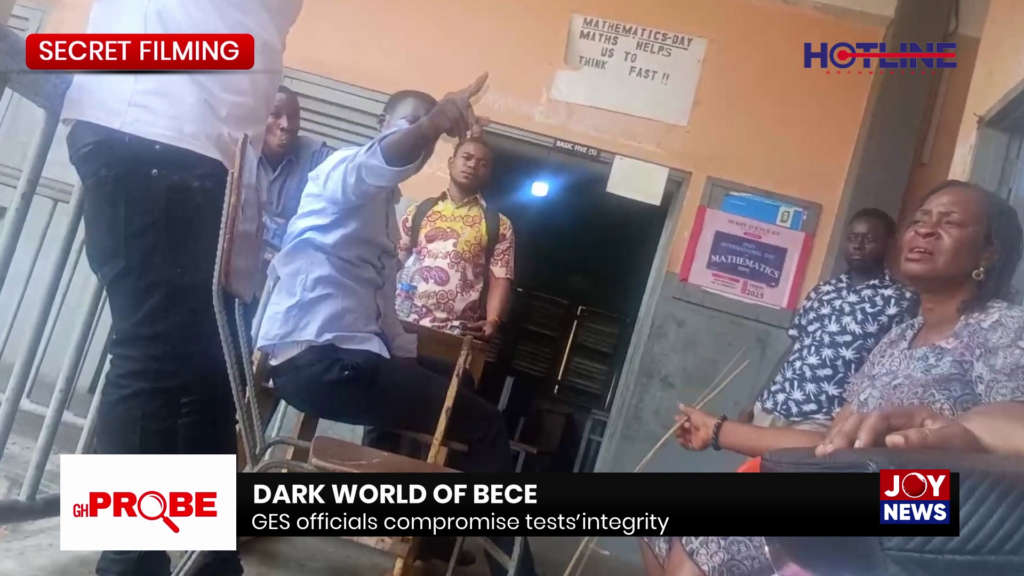
Prof. Ernest Kofi Davis, the Acting Director General of GES, who declined speaking on camera, outlined efforts made by the GES and its major stakeholders to ensure all staff of the service understand the rules governing the exams and the repercussions for violating them.
The sensitization ended a day before the exams:
“Before the examination, we sent our team to join WAEC officials. They toured the whole country. A day before the start of the examination, I issued a press statement, and we told the whole world that if a teacher is caught aiding cheating, that is the end of the teacher; the teacher may be fired.”
Meanwhile, on that same day, some staff members of GES appointed as supervisors for the examination and tasked with the responsibility to relay the rules to the invigilators were rather out-rightly preparing the invigilators to break the rules.
At the Derby Avenue Examination Centre, during a session with invigilators a day before the start of examination, the examination supervisor explained to the invigilators how one would break the WAEC rules:
“Some of them will ask a question but sometimes we don’t know, so you will tell them, I don’t know. If they can ask their friends, if they feel it is correct, I can permit you to ask your friend beside you.
After all, this is not the individual perse but the school, and from here, they are entering into another level, so you can ask your friend to fill the gap. It will be very embarrassing that you didn’t answer a whole question.”
She also gave guidelines to protect the candidates from being caught by external invigilators.
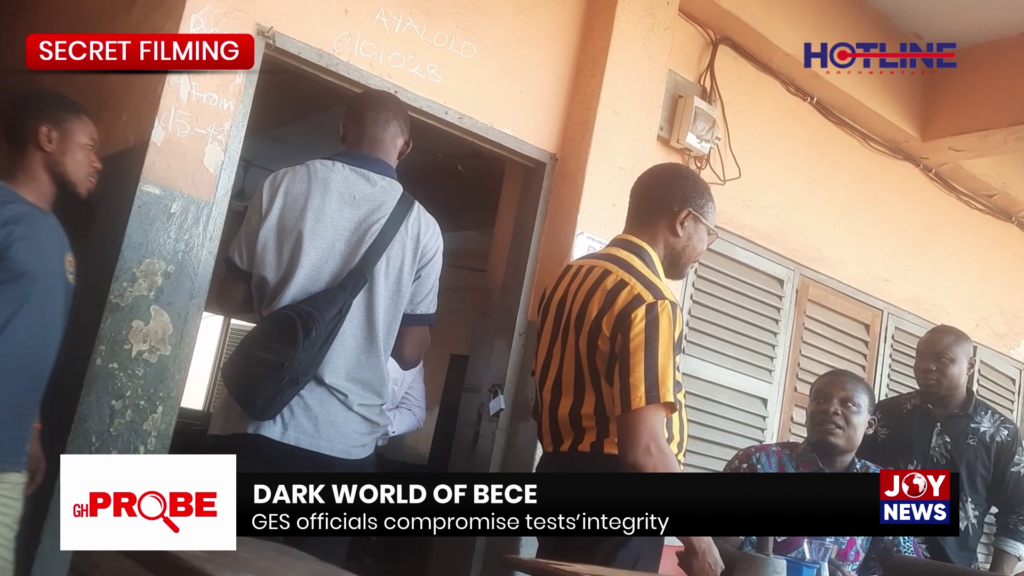
“And you have to talk to them too, when they see strange people, especially when they see us, fine, but immediately they see some strange person coming around, then you the invigilator, you alert them: ‘external invigilator is coming’, so please lower your voice, be on your paper. So you will guide them as and when,” she added.
According to John Kapi, Head of Public Affairs, WAEC, the council spelt out the rules to the supervisors: “Every candidate should do independent work. When you hear us talk about collusion, that is what we are talking about.
Collusion is simply that you have the same thing running through the script of the candidates.
So it tells you that either there has been a certain kind of communication between the candidates or an external source, one source to every single person. So, candidates are supposed to do independent work.”
This, he said, accounts for the sitting arrangement for the examination.
“That is why when you look at the rules, they ask whether each candidate is assigned a desk and a chair and there is a certain distance from one candidate to another so that they do not have the opportunity of communicating with each other.
So, there should be no communication whatsoever between one candidate and the other. If in the course of the examination you have any question, you put up your hand and the invigilator is the only person who should answer the question and indeed, that question should not be a question on your question paper,” he added.
Exams day
Wednesday, June 11, 2025, was the start of examination which would continue till Wednesday, June 18, 2025 and to be written by 603,328 registered candidates across the country.
Pupils enter exams hall without search
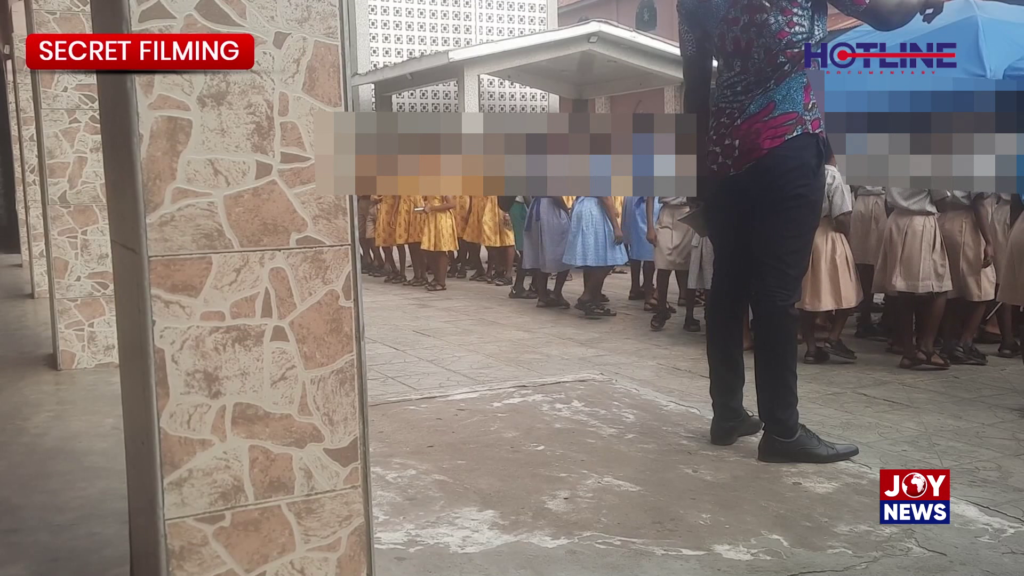
The exams started with the assembly of candidates, after which a SISO reminded the candidates about the laid-down rules by reading them out to the candidates.
They were then matched to the examination rooms without the conduct of searches. It would later be discovered in our investigation that the foreign materials that the search would have found were sanctioned; hence the deliberate skipping of the search.
According to Mr. Kapi, candidates are required to be thoroughly searched before entering the examination halls.
“One of the first things that you do is to search the candidates thoroughly before they go in. That is why we advise 30 minutes wait period, so searching has not been cancelled; it is still an integral part of the process before the examination,” he explained.
Providing answers to candidates
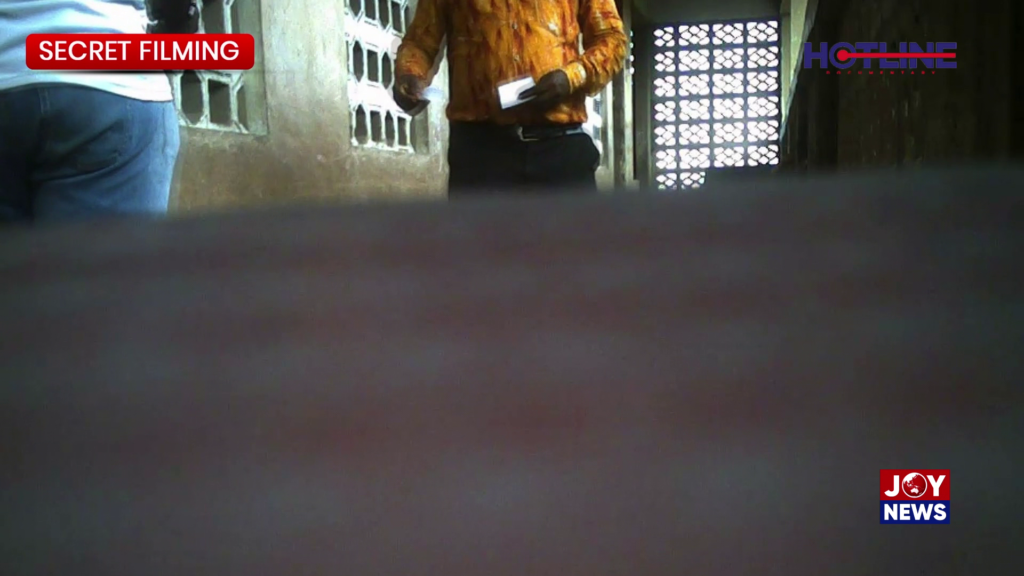
This investigation found that the examination malpractice is perpetrated directly by some staff members of the GES who provide candidates with answers to all the questions.
The answers come through an invigilator dictating the answers; presenting pieces of paper with handwritten answers to candidates to copy and pass on to mates; and – in some instances they come on printed sheets distributed to as many candidates as possible at a go.
At 9:00 a.m. the bell rang as a way of announcing the start of the examination.
Unlike a normal examination hall that is characterised by total silence and focus in the first 30 minutes of the start of the paper, this investigation uncovered a strange phenomenon – the halls were noisy, candidates were not writing anything and some of them were sleeping.
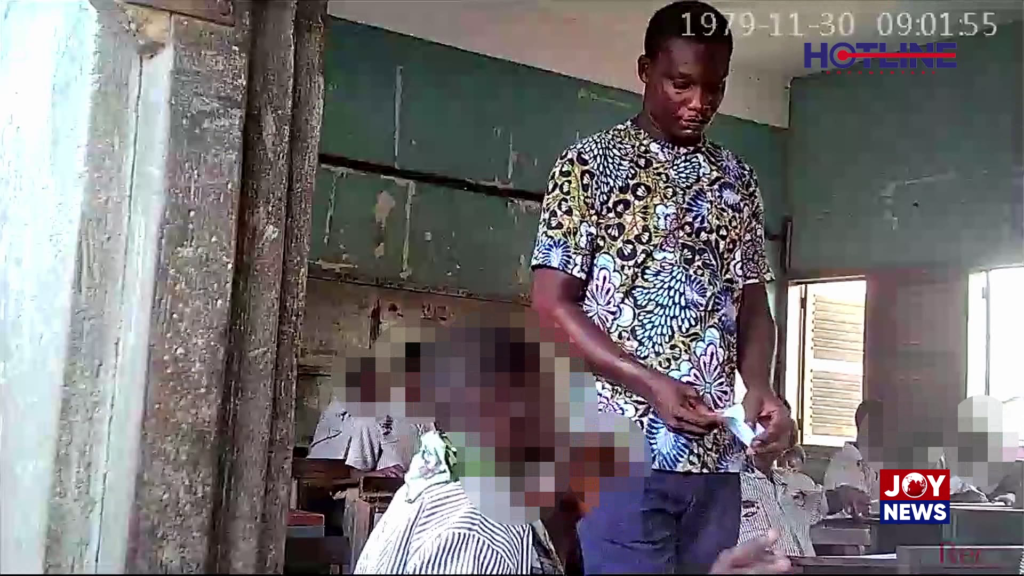
To the utter surprise of GhProbe investigators, about 30 minutes into the exams, some particular invigilators abandoned their duty posts to distribute answers to the questions in batches, one question after the other.
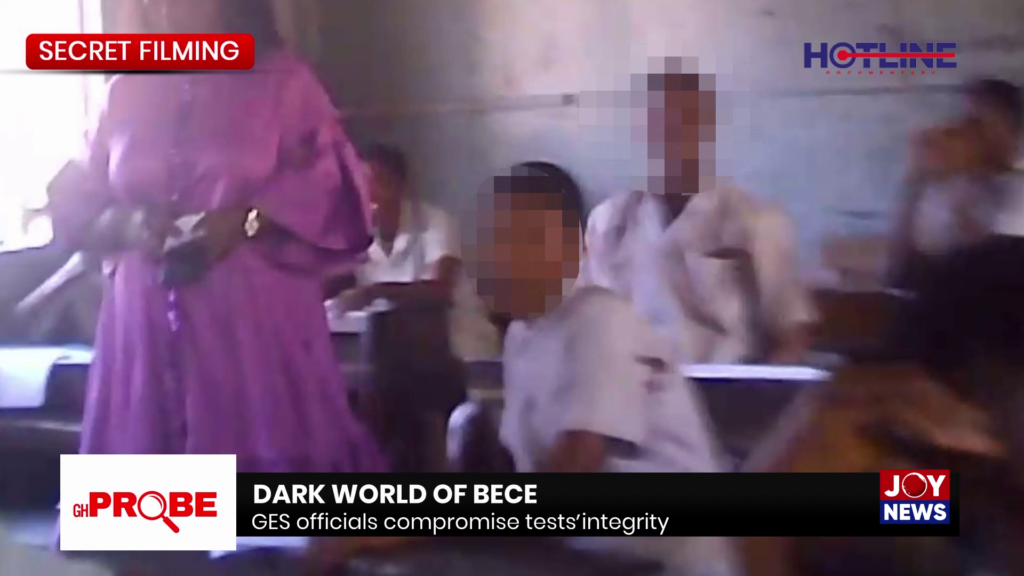
Mr. Kapi described this as an illegal act punishable by law.
“Any possession of any such thing is illegal and you can be prosecuted, fined or incarcerated for a certain period of time.
“Currently, there have been people who have been prosecuted, some of them have been sentenced to three months’ imprisonment, some have eight months and others have 30 days, and so depending on the gravity of the crime and the discretion of the presiding judge,” he noted.
This continued for the rest of the papers – including objective tests in which invigilators, in some instances, dictated the answers to the candidates.
This paints a picture of the scene at the start of the paper.
Mr. Kapi expressly listed the only materials candidates are permitted to receive in the exam halls:
“The answer booklet, the question paper or the objective answer card. These three items by way of paper are the only papers. Apart from these, no other paper should come from anyone to any candidate in the examination hall.”
Besides, he said “so, if any examination official, a supervisor or invigilator, is found distributing any other papers in the examination hall, it is illegal, it is wrong.”
Covering tracks
To ensure that the happenings in the examination halls stayed in the examination halls, all answers distributed on papers were taken back by invigilators before exiting the halls.
The use of phones
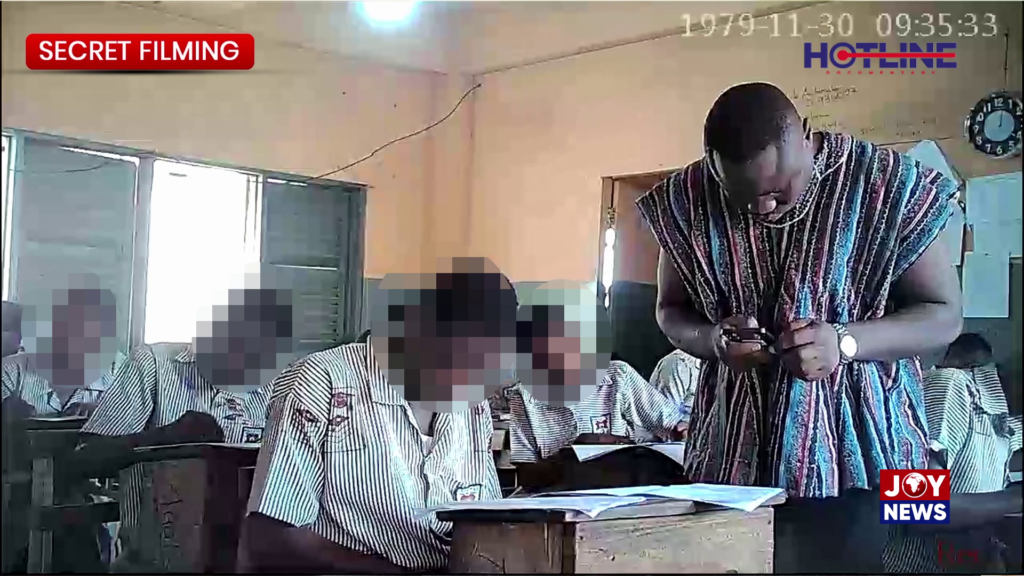
Aside from providing the candidates with answers on papers and by dictation, there was also heavy dependence on mobile phones – a development that appeared to have been sanctioned by the invigilators and supervisors.
The phones were used in two ways: answer transmitted from invigilators to phones of candidates and the use of Artificial Intelligence (AI).
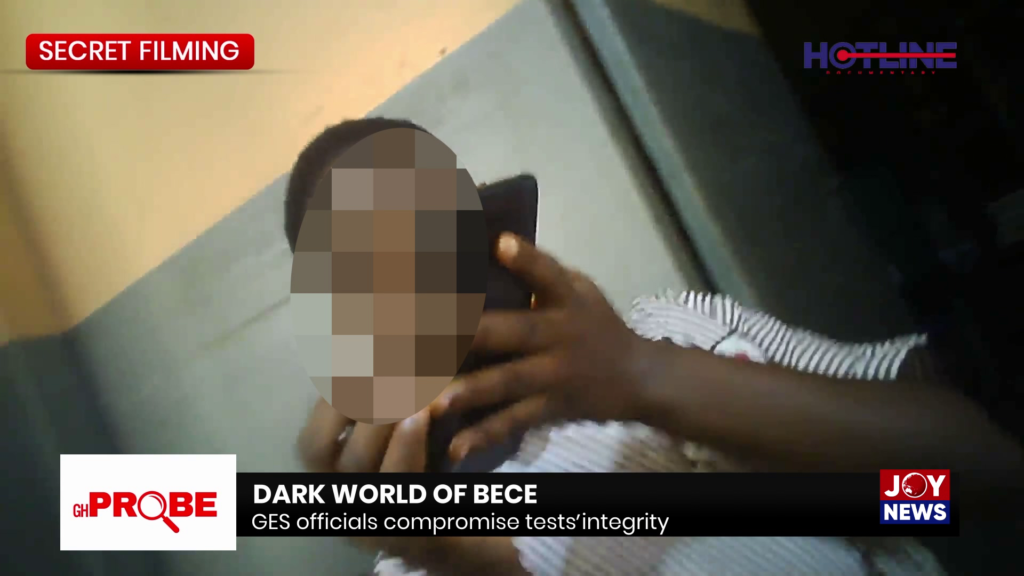
WAEC partly held parents accountable for failing to restrict their children’s access to phones during the examination:
“I think parents should desist from providing mobile phones for their children because at BECE, I believe that, well, much as maybe some of them are big enough to earn money, a child who is in JHS 3 certainly would have gotten the phone from the parents.
“And so, if your child is going to write examination and you say for this week, I’m taking your phone from you, you have not done anything wrong. On the contrary, you are serving a good purpose to help the child to be independent in the work that they do,” Mr. Kapi cautioned.
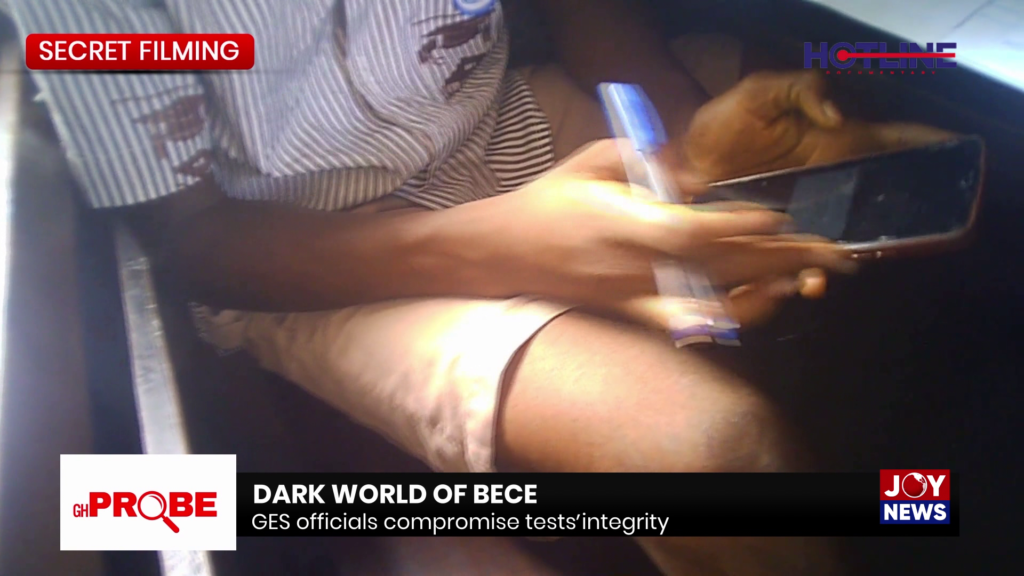
Answer transmission to candidates by invigilators


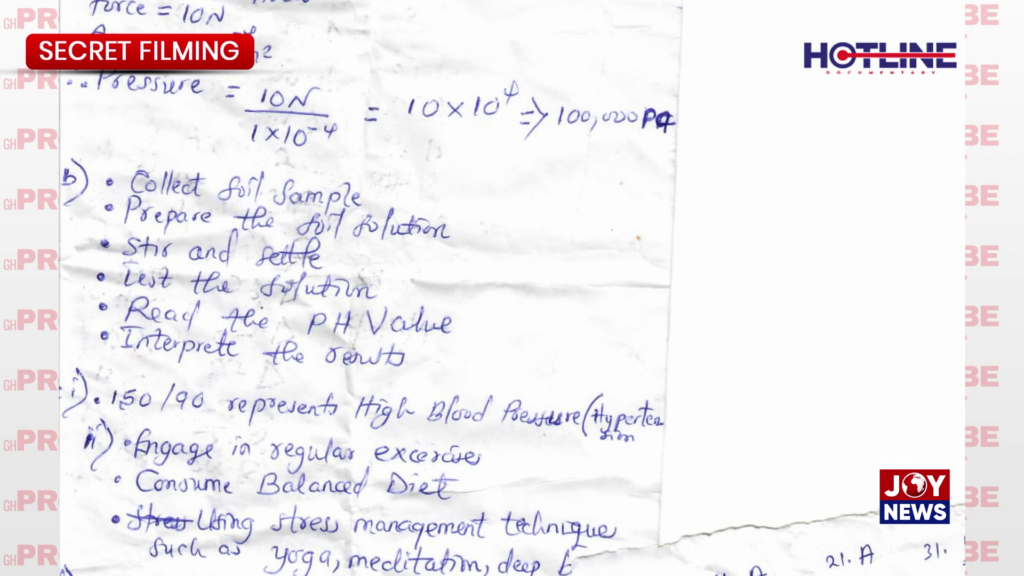
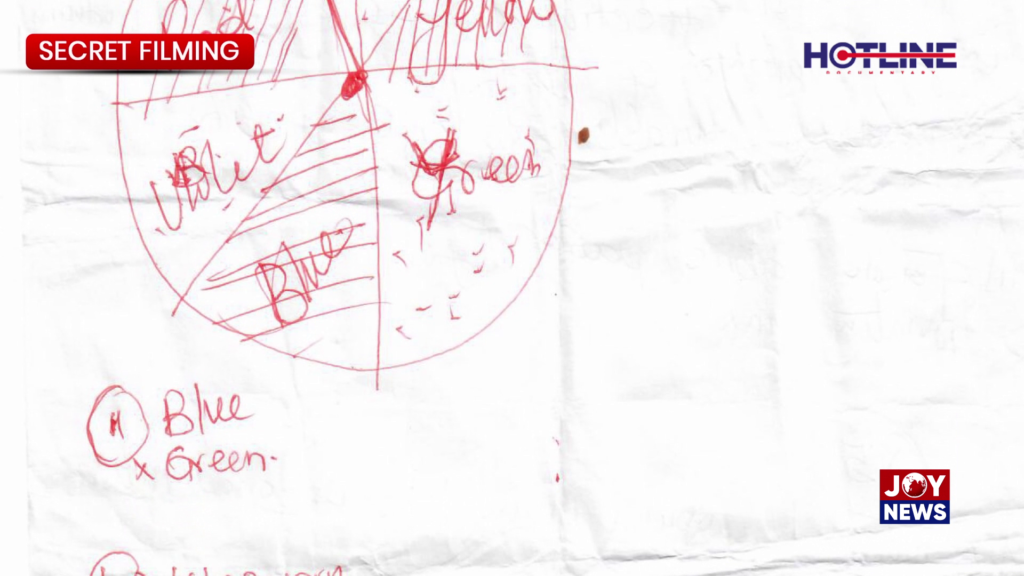
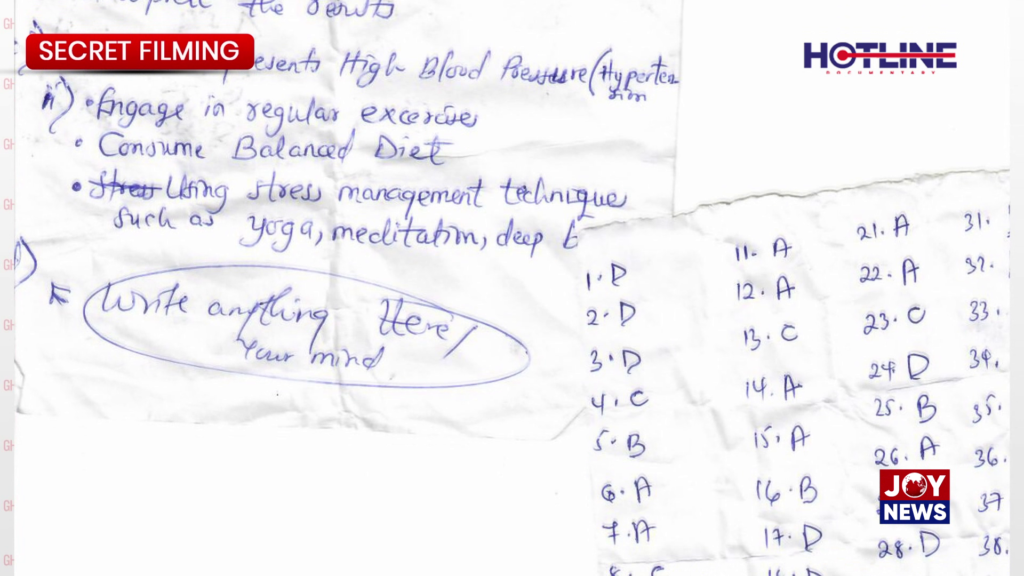
GhProbe found that one invigilator takes phone numbers of candidates in possession of phones, the questions are solved in a so-called strong room and the answers are transmitted to candidates through their mobile phones. They copy and pass their phones on to colleagues who have no phones.
The use of AI
The AI was used in two ways. Some candidates opted for the use of AI in generating answers to the questions and used the entire responses of AI on WhatsApp, while others sought explanations for questions they had been asked to list and explain. This second group, thus, demanded further help as answers invigilators had transmitted to them lacked the explanations.
Some invigilators even joined the candidates in the AI search.
Mr. Kapi outlined strict punishment for phone usage in the examination halls:
“In the past few years, we have decided that henceforth, anybody found with a phone in the examination hall will have their entire results cancelled. Because the phone is for us, as far as examination is concerned, a gadget that has storage facility with which you can access information from any quarters so phones are simply a no go area as far as our examinations are concerned.“
Some candidates brought books into the examination hall from which they copied their answers to their BECE questions.
Mr. Kapi admitted that something went wrong: “Certainly, when we talk about the co-ordinated form of it, I think that with the involvement of all these personnel who I will say should have been helping us but were rather being against us, certainly there was something grave that went wrong in the course of the examination.”
National Security and WAEC officials outwitted
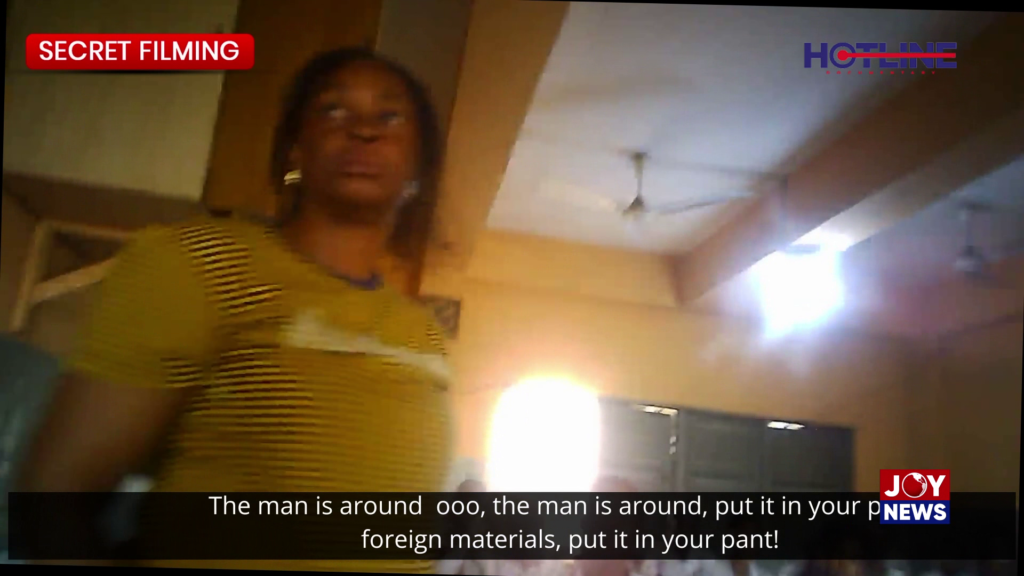
Despite all the malpractices that happened at both centers investigated, there were all indications that the perpetrators successfully avoided being caught by both WAEC external invigilators and officials of the National Intelligence Bureau (NIB) who visited the centers. No arrests were made. Why? On sighting external invigilators, the supervisor received a signal and relayed the alert to invigilators for immediate action.
Invasion of exam centers by teachers, school heads
Teachers and head teachers of participating schools were seen at the examination centers before, during and after every paper, interacting with invigilators and supervisors and actively making offers to influence them financially for assistance to the candidates.
Involvement of SISOs
Derby Avenue center had two SISOs visiting the centers in the course of the examination.
One of the SISOs actively distributed printed answers to the candidates.
The SISO was clearly aware of the invasion of the centers by the teachers and school heads, as in some instances, they were seen interacting with the SISO while the examination was going on.
WAEC described this as unacceptable.
Conflict of interest
Mr. Kofi Asare, Executive Director of Africa Education Watch, a non-profit education policy research and advocacy organization, said the categories of people selected to supervise the examination had vested interest in the pass rates, hence assigning them to supervise the examination meant putting them in a conflicting situation.
He said “our position is that because staff of GES have vested interest in the outcome of the examination, including some of their staff having KPIs directly related to the pass rate in the examination, deploying them as supervisors is actually putting them in a conflicting situation but the system hasn’t listened.
“We at Eduwatch believe that a head teacher should not be allowed to supervise exams in their school and we also believe that even at the district education office, we can’t call them as supervisors because if the head teacher cannot supervise examination in their schools, I don’t see why the SISO can supervise.”
Final motivation
GhProbe established that the collusion by invigilators with candidates to breach the integrity of the examination was motivated by financial gains as invigilators were given various sums as financial gifts in the course of the exams.
At the Derby Avenue R.C. exams center, on the first day of examination, for example, while preparing exam materials for candidates to commence writing, invigilators were invited by the supervisor to a meeting with the headmistress of the host school, Derby Avenue R.C.
She announced a daily GHS60.00 gift for each invigilator for the duration of the examination.
Candidates were also instructed to give their invigilators money at the end of every day’s examination.
At the St. George’s Anglican Basic School examination center payment was made in bulk. The supervisor handed envelopes containing GHS 400.00 to each invigilator.
Final payment (Aseda offertory)
Not many schools wrote the final paper so for the centers investigated, the exams ended on June 17, 2025.
Days earlier, candidates at Derby Avenue were informed to prepare financially for an offertory called the ‘Aseda offertory’, which would be collected before the start of the final papers at the center.
This offertory was meant to thank invigilators for their assistance in the examination.
On the morning of the final paper, the invigilator who announced the ‘Aseda’ offertory the previous day (he later got the nickname ‘Sir Aseda’), would move from one exam hall to another with a box for collection of the offertory. Candidates were asked to pay GHS5.00 or more. The total amount collected was shared among the invigilators.
Each invigilator received at least GHS60.00 as their share of the unspecified total sum raised in the ‘Aseda’ Offertory.
Leakage of question papers
In the past few years, WAEC has struggled with leakages of question papers prior to the start of exams.
Mr. Kapi outlined the reforms implemented to block leakages.
According to him, WAEC increased its collaboration with its partners, GES, Ghana Police Service, the NIB, locally trained officers and staff to ensure increased presence across the country to monitor the examination.
He further stated that the reports WAEC received indicated that but for the presence of these people, a lot could have gone wrong in the conduct of the examination.
Mr Asare reflected on evolving examination malpractice strategies: “Leakage in question papers occurred between 2020 and 2022 and that was a bigger dimension of examination fraud but since 2023 that the Ministry of Education brought in the BNI (now NIB), to take over the question and printing security, we’ve not been seeing leakages in the dimension that we used to see.
“Questions hardly leak but because there is a demand and supply and a business case for that matter, the teachers who are involved in this crime have suddenly re-strategized and moved from having fore- knowledge of the question, solving them and giving them to the students before the examination to an era where they collude in the examination hall.”
Indeed, the strategy by WAEC appeared effective as leakages of question papers, referred to as APOR, were not recorded and questions arrived at examination centers securely sealed during GhProbe’s investigations.
Other cases
It is important to note that WAEC took record of more than 43 arrests made in the course of the 2025 BECE examination.
They committed different offences of examination malpractice in different parts of Ghana.
“We recorded people related to the examination who were directly involved in malpractices.
There were cases of a supervisor, assistant supervisor, teachers, administrators of schools, and two cases where heads of the basic schools were involved. So yes, it is true that it was co-ordinated,” Mr. Kapi added.
GES on punishment
Prof. Davis said that the GES would be unable to continue working with any staff member found to have been involved in any form of examination malpractice, amplifying the directive of the Minister of Education, Haruna Iddrisu, to dismiss culpable staff members from the service:
“The point is we can’t work with you. Yes, code of conduct is there but we hired you, and we feel you are a threat and you cannot be with the students, so you want us to send somebody who will go and instead of teaching the students in the classroom to pass, he decides to take the answers to the students in the exams room, you want us to keep the person in the school?”
Negative impact of exams malpractice
Mr Asare of Eduwatch said: “The major impact of examination malpractice is felt on the social fibre of our society, that is where we breed corruption. We teach our children corruption in basic schools.
Corruption 101 is what we teach them when we support them to participate in examination fraud and examination malpractice at the basic level. So, you are grooming the child to understand that corruption is normalized and once you can make it, the most important thing is that you have made it.
If you start teaching your child corruption in basic schools, the child will never unlearn it at the tertiary level and they will grow and become corrupt citizens, corrupt adults, that for me, is the most damaging impact of examination malpractice.”
Prof. Davis also decried the negative impact of examination malpractice to the nation:
“We don’t want to have professionals who have cheated their way through because once they finish secondary school, they are going to university and they will come out as professionals, and I don’t think anybody will be happy being operated on by a doctor who cheated his/her way through education, so we frown on it and any head who will do that should pray that he/she is not caught.”
Solutions
WAEC wants to be given the power and resources to recruit invigilators of the highest standard, to help curb the practice of examination malpractice.
WAEC is further demanding adequate supervision of teachers to ensure that candidates are properly prepared to independently write and pass their examination.
“If you look at the fact that a teacher would want to go and assist their own children in an examination hall, the least conclusion you can come to is that this person hasn’t done his job in the classroom in terms of preparing the children for the examination, so ill preparation of these candidates may be the major factor that is pushing them to go out there and try to assist the candidates in the examination hall,” Mr Kapi added.
Source: Ghprobe.com
ALSO READ:
- 2025 BECE: How GES officials colluded with candidates to cheat [Watch]
-
Some GES officials took GH¢60 to aid cheating in 2025 BECE – JoyNews exposé
Watch the full video below:


